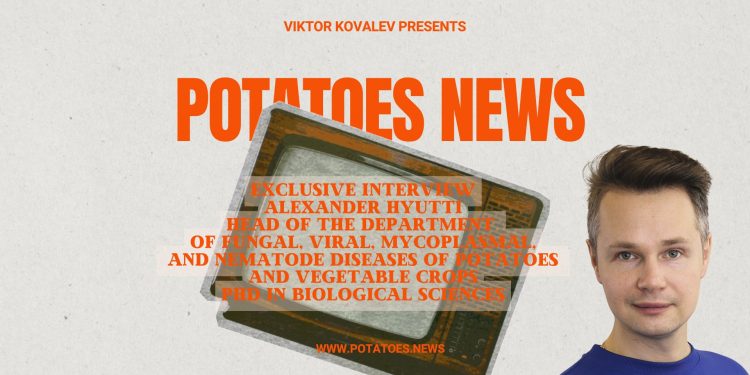The year 2024 has been marked by significant climate fluctuations, which have greatly affected the condition of potato crops and their vulnerability to various diseases. We interviewed Alexander Hyutti, PhD in Biological Sciences and Head of the Department of Fungal, Viral, Mycoplasmal, and Nematode Diseases of Potatoes and Vegetable Crops, to understand how this year’s weather conditions are impacting the spread of potato diseases and what precautionary measures farmers should take.
Impact of Weather Conditions on Potatoes
According to the expert, the moderately rainy summer of 2024 has created favorable conditions for the development of fungal, viral, and nematode diseases. There is a high risk of diseases like late blight, early blight, and other fungal infections, which thrive in high humidity and fluctuating temperatures. The combination of drought and rainfall contributes to pathogen outbreaks, which can severely impact crop yields.
Reported Disease Outbreaks and Control Methods
Alexander Hyutti mentioned that several potato disease outbreaks have already been registered this season. For instance, late blight has shown aggressive spread in many areas. To combat such diseases, it is crucial to conduct timely preventive treatments using both chemical and biological protection measures. This can help control infections and minimize yield losses.
Risks for Potato Storage
Additionally, this year’s weather conditions could also affect the quality of potato storage. Storing potatoes in high humidity conditions increases the risk of fungal and bacterial diseases activating. Modern science offers ways to improve storage technologies, including the use of biopreparations that reduce disease-related losses during storage.
Recommendations for Farmers
The expert emphasizes the importance of monitoring potato conditions and taking preventive measures in light of climate change. In 2024, the key focus should be on early detection of diseases through soil monitoring and analysis technologies. Alexander Hyutti also recommends the increased use of biological protection products to prevent the spread of late blight and other dangerous fungal infections.
Forecasts and Future Prospects
In the coming years, according to the expert, approaches to potato disease protection will drastically change due to climate change and the emergence of new pathogens. There is already growing interest in biopreparations and early disease detection technologies, which could significantly improve the situation with disease control in potato farming.
Want to be featured in our program?
Contact us on WhatsApp at +51939995140!







